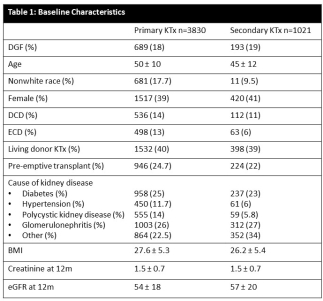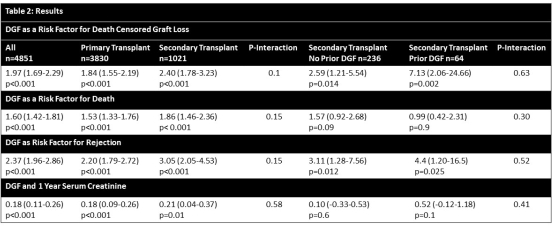Does DGF Result in Worse Outcomes in a Second Transplant?
1Department of Medicine, University of Wisconsin, Madison, WI
2Department of Population Health, University of Wisconsin, Madison, WI.
Meeting: 2018 American Transplant Congress
Abstract number: D80
Keywords: Graft survival, Kidney transplantation, Outcome, Rejection
Session Information
Session Name: Poster Session D: Kidney Complications: Late Graft Failure
Session Type: Poster Session
Date: Tuesday, June 5, 2018
Session Time: 6:00pm-7:00pm
 Presentation Time: 6:00pm-7:00pm
Presentation Time: 6:00pm-7:00pm
Location: Hall 4EF
Delayed graft function (DGF) is a risk factor for patient death, kidney allograft loss, reduced allograft function and acute rejection after kidney transplantation. Prior transplant and previous DGF are both associated with greater risk of DGF following second transplant, but second transplants result in similar graft survival as primary allografts overall.
We examined the effect of DGF on primary (n=3830) versus secondary (n=1021) kidney transplants at a single transplant center. We hypothesized that DGF in a second transplant would result in worse patient and kidney allograft survival.
The majority of patients were Caucasian, male and received a deceased donor kidney transplant (table 1).  DGF occurred in 18% of primary transplants and 19% of secondary transplants. The presence of DGF was strongly associated with death-censored graft failure, recipient death, the incidence of rejection and higher serum creatinine at one year for both primary (all p<0.001) and secondary transplants (all p≤0.01) transplants (table 2).
DGF occurred in 18% of primary transplants and 19% of secondary transplants. The presence of DGF was strongly associated with death-censored graft failure, recipient death, the incidence of rejection and higher serum creatinine at one year for both primary (all p<0.001) and secondary transplants (all p≤0.01) transplants (table 2).  The strength of these associations did not differ significantly but were stronger for secondary transplants (all p-interactions ≥0.10).
The strength of these associations did not differ significantly but were stronger for secondary transplants (all p-interactions ≥0.10).
Similarly, the associations of DGF with outcomes were somewhat stronger, but not significantly different, in those receiving a secondary transplant with, versus without, previous DGF (all p-interactions ≥0.30). Our results did not change with including patients with more than 1 retransplant.
DGF is associated with poorer patient and allograft survival, increased risk of rejection, and poorer graft function at 1 year. The impact of DGF on outcomes, does not differ significantly by secondary transplant or previous DGF.
CITATION INFORMATION: Muth B., Astor B., Blazel J., Turk J., Mandelbrot D., Djamali A., Parajuli S. Does DGF Result in Worse Outcomes in a Second Transplant? Am J Transplant. 2017;17 (suppl 3).
To cite this abstract in AMA style:
Muth B, Astor B, Blazel J, Turk J, Mandelbrot D, Djamali A, Parajuli S. Does DGF Result in Worse Outcomes in a Second Transplant? [abstract]. https://atcmeetingabstracts.com/abstract/does-dgf-result-in-worse-outcomes-in-a-second-transplant/. Accessed February 13, 2026.« Back to 2018 American Transplant Congress
